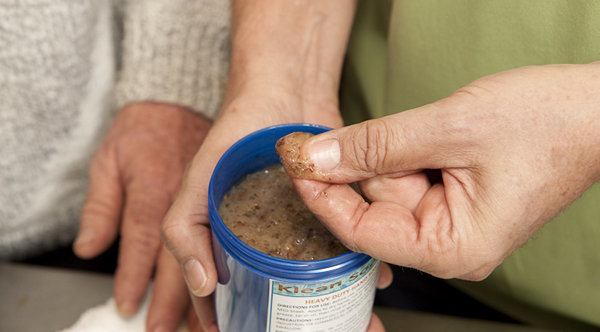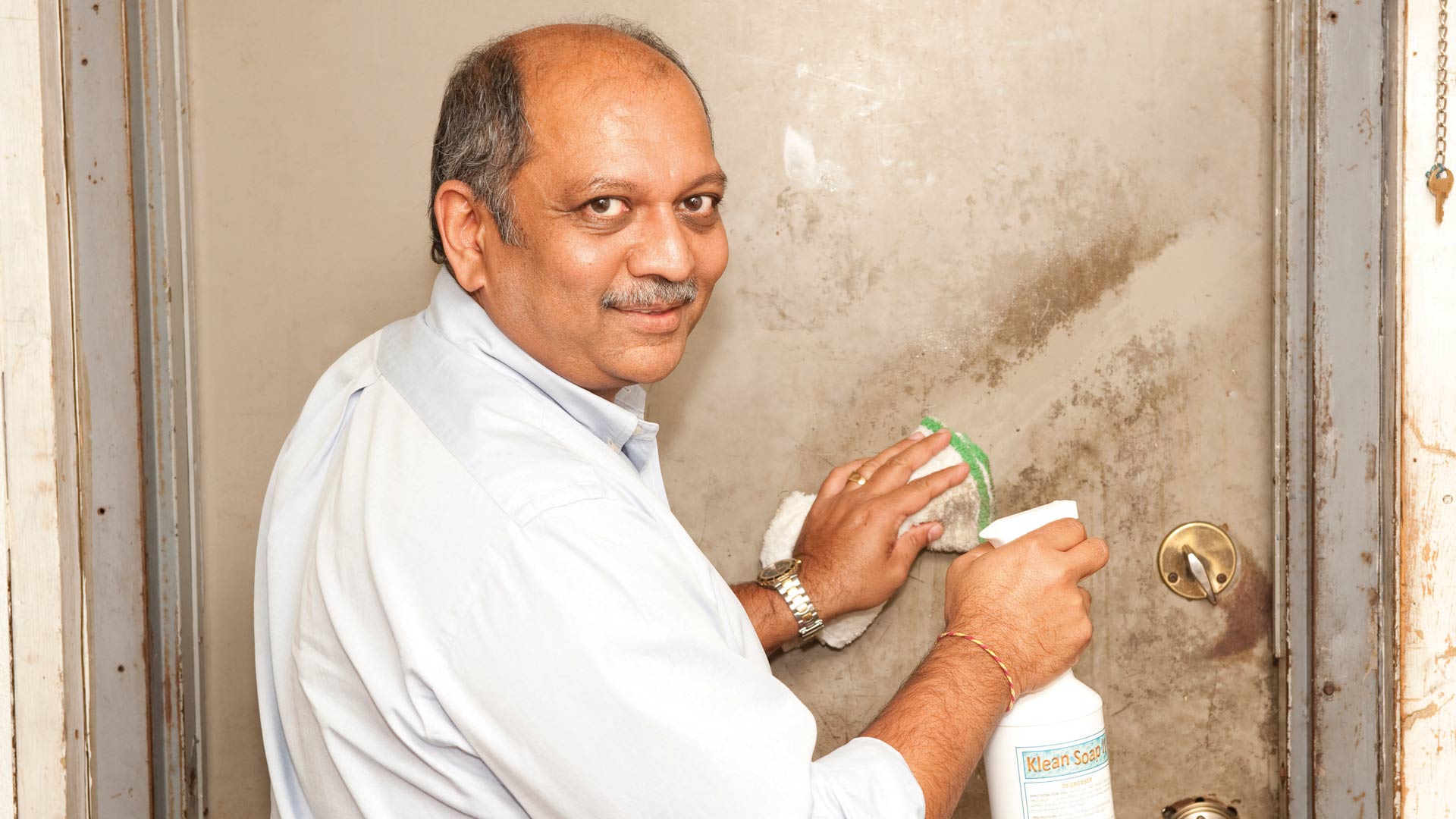–by Liz Morrison
photos by Rolf Hagberg
In the early days of radio, “Klean Soap” was a fictitious product that helped advertisers understand how to use the new medium.
Now, there’s a real Klean Soap.
 Last January, with help from AURI, a group of Twin Cities entrepreneurs launched a line of “green” cleaners made from recycled vegetable oil and glycerin.
Last January, with help from AURI, a group of Twin Cities entrepreneurs launched a line of “green” cleaners made from recycled vegetable oil and glycerin.
The Klean Soap product line includes liquid degreaser, carpet shampoo, chewing gum remover, stain remover, and a heavy-duty mechanics’ hand cleanser that contains corn cob grit. Glass cleaner and everyday hand soap are in the works.
“We’re taking waste oil and recycling it two times over — first to make biodiesel fuel and then to make soap,” says Cassandra Rodrigue, one of the partners in the start-up company, Klean, LLC. Other partners include Cassandra’s parents, Tom and Julie Rodrigue, her sister Tamara Rodrigue, and businessmen Dipak Patel and Jerry Seehusen.
Soap by accident
The soap venture grew out of the Rodrigue family’s main business, Cedar Towing & Auction, Inc., in Minneapolis. A few years ago, Tom Rodrigue, an idea man and do-it-yourself kind of guy, got interested in making biodiesel to fuel his company’s tow trucks. He collected used vegetable oil from restaurants at the Minneapolis-St. Paul airport and started experimenting.
His first attempt at making biodiesel in a 45-gallon reactor flopped. “I produced a bunch of glop!” Cleaning out the equipment afterwards, he noticed that “my hands were very clean and very soft.” He’d made soap by accident!
Tom persisted with the biodiesel enterprise, launching Cedar Biofuels in 2009. The business converts about 3,000 gallons of used cooking oil a month into renewable biodiesel, which Cedar Towing uses in its fleet, reducing the company’s fossil fuel consumption.
One of the byproducts of biodiesel manufacturing is glycerin, a common ingredient in soap. Thinking back to his original batch of accidental soap, and its remarkable degreasing powers, Tom wondered if he could produce not only fuel, but also a really good cleaner.
That question led the Rodrigues to Doug Root, a senior scientist at AURI’s Marshall analytical chemistry lab. Earlier, Root had advised Tom on small-scale biodiesel production.
Root says that, “Producing quality biodiesel fuel is challenging for small-scale producers and ‘off-spec’ fuel or glop must be kept out of the commercial markets. I was glad to help the Rodrigues find a business opportunity from an initial failure to produce acceptable biodiesel for their towing business.”
He now helped the family purify the crude glycerin coming from their biodiesel plant, and perfect their product recipes and manufacturing process. “This would never have gotten off the ground without Doug’s help,” Tom says.
The first hurdle was producing consistent soap products from a wide variety of used fats and oils with different characteristics and impurities. “What you put in is what you get out,” says partner Dipak Patel. “Our input is variable, so our biggest challenge is standardization.”
Another challenge was product color. “We started out thinking we needed to change the color,” Cassandra says. The liquid soaps “looked like root beer,” crude glycerin’s natural color. Root helped the group explore several bleaching options, but each had disadvantages, so “they decided to market the cleaners with the natural color of the components,” Root says. Sticking with the natural color also fits their green product branding, Cassandra adds.
Scent was also a problem, Patel says. The original cleaners gave off a whiff of French fries! The group experimented with different fragrances, finally settling on a lemon scent for the degreaser and carpet cleaner and a fresh linen scent for the hand cleanser.
Testing at the airport
Klean Soap products are now being tested at the Minneapolis-St. Paul Airport by ABM, which provides facility maintenance and janitorial services. There’s a lot of grease cleanup to be done from the fryers in airport restaurants, says Tom Hunter, ABM airport operating manager. Chewing gum stuck to the carpet is another problem. “Tom Rodrigue asked us to try their Klean Soap products, and they performed really well,” Hunter says.
The degreaser and carpet cleaners “are highly concentrated, so it takes less product to do the job, and they don’t leave a lot of residue like some cleaning products.” On tile, the degreaser “seems to get the grout cleaner than other products.” It’s also effective on hard surface floors, rubber mats, and frying equipment.
Another advantage: the environmentally friendly cleaners don’t need any special treatment before disposal, Hunter says, so cleaning water can be flushed down the drain.
“It’s one of the best soaps we’ve used,” says Denise Fauke, ABM account manager. “And it’s a nice story,” she adds — one that fits in well with the Metropolitan Airport Commission’s strong focus on recycling.
Targeting commercial cleaners
Klean Soap is now working on sales and distribution plans. The soap market “is an extremely competitive industry,” Patel says. But the little start-up has two important advantages, Root notes: “Access to low-cost fats and oils, and customers who want to try their products.”
Klean Soap hopes to enter the expanding retail market for green household cleaners, which rang up sales of $640 million in 2011 — up from about $300 million in 2007, according to Packaged Facts, a market research firm.
To start, though, the company is targeting janitorial services and commercial facilities, such as restaurants. Patel and Seehusen operate a property management company that contracts cleaning services, giving Klean Soap a link to that market, too.
Getting the new venture off the ground has been tough, says Tamara Rodrigue, but “We all believe in this.” Cassandra adds: “Klean Soap works so well, and we love the meaning behind it.”
AURI and Klean Soap
Idea to reality:
A Minnesota family company wanted to use recycled vegetable oil and glycerin from their small biodiesel plant to make green cleaning products. They needed help with glycerin purification and product formulation and testing.
AURI’s role:
AURI scientists helped purify the crude glycerin andperfect the product recipes and manufacturing process for Klean Soap.
Outcomes:
Klean Soap now makes five all-natural cleaning products, which are being tested at the Minneapolis-St. Paul Airport. The company is also seeking green certification and setting up a distribution network.
